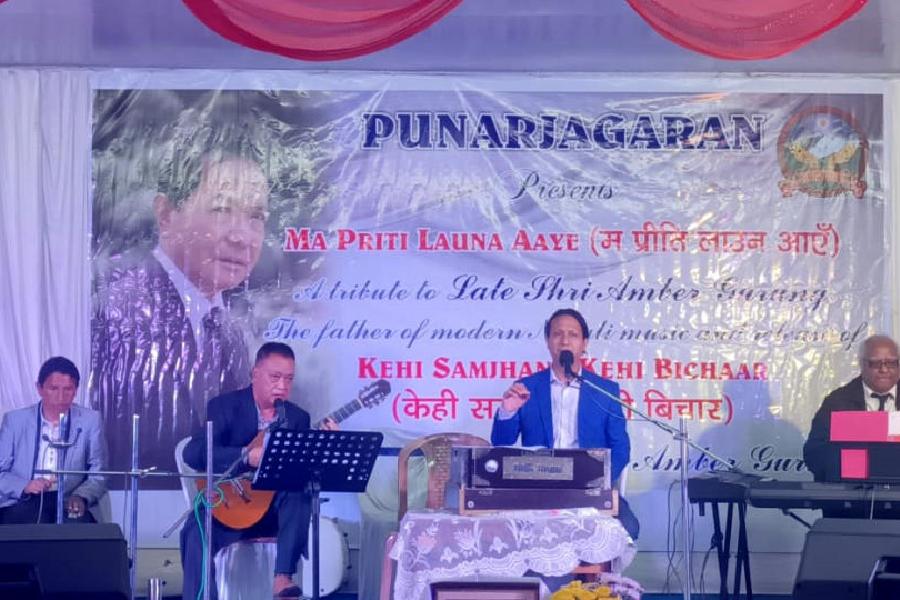Darjeeling on Saturday witnessed the renaissance of unknown works of Amber Gurung, the famous musician who had composed Nepal’s national anthem.
Punarjagaran (renaissance), a recently formed group of music and literature enthusiasts of Darjeeling, released a book “Kehi Samjhana, Kehi Bichar (Some Memories and Thoughts)” containing the unpublished writings of Amber at Darjeeling Gymkhana Club.
The group had invited Kishore Gurung, an expert on Nepali music and son of Amber, and his troupe to Darjeeling for the event titled “ma priti launa aaye (I have come to spread love)”.
Kishore and his troupe surprised Darjeeling by rendering unrecorded — and hence unheard — songs of the maestro.
“He had left behind a collection of more than 300 unrecorded songs,” said Kishore during a free-wheeling conversation with The Telegraph. Amber breathed his last on June 7, 2016.
One of the unrecorded songs sung in Darjeeling was “Sugauli sandhi (treaty)”.
The treaty of Sugauli was signed between British India and Nepal in 1816, whereby Nepal had to relinquish parts of Sikkim, Darjeeling and also Kumaon and Garhwal of north India.
Amber rose to prominence when he composed the song Nau Lakha Tara (nine lakh stars), which was written by the famous Nepali poet,Agam Singh Giri, about the sufferings of the Nepali-speaking Indians in the early1960s.
“The song was briefly banned, my father was also sent to jail (because of the song),” said Kishore.
Amber also left his job as the music chief of the folk entertainment unit of the information and cultural department, West Bengal.
“We as a family were in distress when my father was jobless,” said Kishore.
The musician was, however, invited by King Mahendra of Nepal, twice, following which he went to Kathmandu in 1969.
In Nepal, Amber headed various musical institutions. In 2007, he composed Nepal’s new national anthem, Sayaun Thunga Phulka.
“I could see the tension in him when he was entrusted with composing the national song. He wanted to make it simple so that it could be sung on all occasions.
“He made 13-and-a-half compositions for the anthem,” said Kishore, explaining that the “half composition” was one that Amber did not complete.
Kishore is also a renowned musician, who has done his master’s in ethnomusicology in the United States and has made presentations at many renowned music universities worldwide.
Gazendra Rai, the convener of Punarjagaran, said during Kishore’s visit to Darjeeling last year, they had heard about the unwritten and unrecorded works of Amber.
“One of our friends, Devendra Gurung, then told (Kishore) that it was not just the family’s property but of the entire Nepali community. It was then decided that his unpublished works and unrecorded songs would be made public and this is how everything started,” said Rai.
The recently formed group also plans to nurture budding talents in the region.











